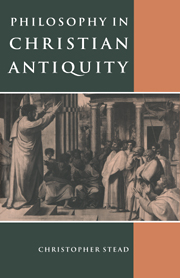Book contents
- Frontmatter
- Contents
- Preface
- List of abbreviations
- PART I THE PHILOSOPHICAL BACKGROUND
- PART II THE USE OF PHILOSOPHY IN CHRISTIAN THEOLOGY
- 8 The debate about Christian philosophy
- 9 Greek and Hebrew conceptions of God
- 10 Proofs of the existence of God
- 11 God as simple unchanging Being
- 12 How God is described
- 13 Logos and Spirit
- 14 Unity of substance
- 15 Substance and Persons
- 16 Christ as God and Man
- 17 Two natures united
- PART III AUGUSTINE
- Bibliography
- Index of Names
- Index of Subjects
15 - Substance and Persons
Published online by Cambridge University Press: 29 September 2009
- Frontmatter
- Contents
- Preface
- List of abbreviations
- PART I THE PHILOSOPHICAL BACKGROUND
- PART II THE USE OF PHILOSOPHY IN CHRISTIAN THEOLOGY
- 8 The debate about Christian philosophy
- 9 Greek and Hebrew conceptions of God
- 10 Proofs of the existence of God
- 11 God as simple unchanging Being
- 12 How God is described
- 13 Logos and Spirit
- 14 Unity of substance
- 15 Substance and Persons
- 16 Christ as God and Man
- 17 Two natures united
- PART III AUGUSTINE
- Bibliography
- Index of Names
- Index of Subjects
Summary
The previous chapter has alluded to problems which arose from an imperfect understanding of the terms ousia and hypostasis. In the West Tertullian's formulation una substantia, tres personae was accepted by thinkers whose theological interests were perceptibly different from his own; whereas Tertullian was anxious to uphold the distinct existence of all three Persons, his Roman contemporaries and successors laid more stress on the divine unity. In the East there was no agreed formula, and tensions were sharper. Many Easterners reacted strongly against modalist teaching. Origen spoke of three hypostases, partly in order to maintain the substantial reality of Son and Spirit; but the phrase came to suggest his distinctive trinitarian teaching which ranked the three Persons in a descending scale of dignity and power. Some Easterners, either to avoid this implication or in imitation of Western usage, spoke of ‘one hypostasis’; but this again could suggest that only the Father is substantially real, the others being only his energies or functions. In the heat of theological debate there was little concern for reflection on the terms employed. Theologians drew no clear distinction between hypostasis and ousia, though there was some difference of nuance. Origen's use of the latter term was not clear-cut. Later Origenists thus disliked the term homoousios, which seemed uncomfortably close to the much-detested ‘one hypostasis’; but they were not unalterably opposed to it; a hard-line insistence on three ousiai remained a rarity.
- Type
- Chapter
- Information
- Philosophy in Christian Antiquity , pp. 173 - 186Publisher: Cambridge University PressPrint publication year: 1994



